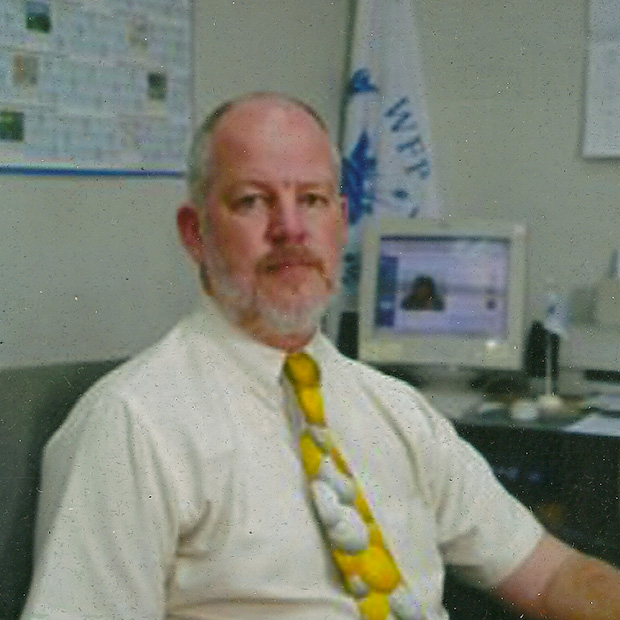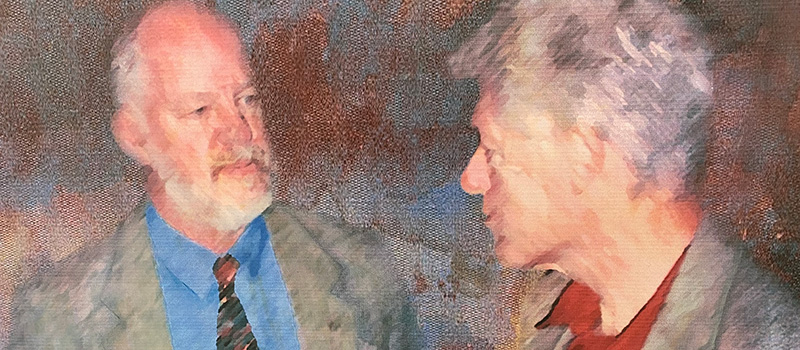Feeding the world after disasters and wars
March 15, 2023 — “From here to Timbuktu” is a phrase heard on occasion, usually in a humorous manner to describe someplace really far away.
 Jeff Taft-Dick ’73
Jeff Taft-Dick ’73
Jeff Taft-Dick ’73 jokingly says that he’s one of the few Americans who have actually been to Timbuktu (a city in Mali), one of the regions for which he was responsible for while working for the World Food Program (WFP). During his 31 years with the WFP, Taft-Dick and his family lived in a total of nine countries: Mali, Liberia, Mauritania, Philippines, Chad, Italy, Pakistan, Sri Lanka, and Niger.
The World Food Program started in the 1960s as an agency of the United Nations, supporting food assistance projects in developing countries through surplus food from industrialized nations. At first, work in these countries was mostly program-specific such as school lunches and rural infrastructure food-for-work projects. Only a small portion consisted of short-term interventions following natural disasters. Taft-Dick notes that this has since flipped.
“When I retired in 2009, the overwhelming majority of our food assistance was directed to natural disasters and displaced populations due to civil strife and war,” he says.
Each position Taft-Dick held with the WPF has left significant impacts upon him.
In the spring of 1996, he was a part of a joint mission that was the first to be officially received by the Taliban in Kandahar. “We had two women on that mission,” he recalls. “It was interesting to see the young Taliban boys serving tea to women for the first time in their lives.” In Chad, they had to evacuate during a coup d’état. But his most memorable and proudest work was amidst the powerful Indian Ocean tsunami that devastated Sri Lanka while he was stationed there as country director of WFP.
“We lost 35,000 people in the first hour of that tsunami,” Taft-Dick says. Within days, his staff of 50 burgeoned to over 325, and they all worked seven days a week for more than four months.
“I was proud of the fact that I led our large team there in the response. I was asked to stay on for another year as the recovery and rehabilitation phase lasted a much longer time,” Taft-Dick explains. “At one point, we were feeding one million Sri Lankans, and we fed 5% of the population for almost a year.” One month after the tsunami, in recognition of his tireless efforts, Taft-Dick was appointed director, the highest level in the WFP.
In 2020, the Nobel Peace Prize was awarded to the WFP. Even though it had been years since his retirement, Taft-Dick and his fellow retired colleagues still felt immense pride for this accomplishment.
“Over my career with WFP, we became an integral part in the delivery of the United Nations system humanitarian assistance on the front lines in the world’s poorest countries,” Taft-Dick says. “I am personally very proud of my contribution to WFP’s evolution and the fact that WFP’s work has been honored through its selection as the 2020 Nobel Peace Prize recipient.”
As a retired director, Taft-Dick received a Nobel Peace Prize pin.
“That was a real thrill,” he says. “The WFP wasn’t well-known early in our existence. Many times, people would confuse us with the WHO or World Bank. With the Nobel Peace Prize, this recognition finally occurred, which was better late than never.”
As a high school student in Vermont, Taft-Dick was a three-sport athlete, and, as he looked toward college, his parents enrolled him in the Athlete Placement Bureau. “I thought I’d go to school in Ohio where we had lived before,” he says. “But Coach John Pfitsch at Grinnell reached out.”
He remembers his visit vividly, hitchhiking to Grinnell from the Des Moines airport, then meeting with coach Edd Bowers ’43 among others. “After that, Grinnell became my top choice,” Taft-Dick says. “I was offered financial assistance which enabled me to attend. Now when I get thanked for my donations to Grinnell, I remind them that I’m just paying it forward.”
Taft-Dick plunged in fully as a Grinnell student. “I was determined to do everything possible to get a solid education, no matter what I did after.” Even with ongoing athletic practices and games, Taft-Dick managed to attend almost every Rosenfield lecture, signed up for classes with visiting professors, and availed himself of countless other opportunities. “I didn’t understand why every other student wasn’t taking advantage of these experiences,” he recalls.
A psychology major who also delved deeply into history and education courses, Taft-Dick envisioned becoming a teacher and coach. Soon into his post-Grinnell time, however, he discovered the Peace Corps and, on a whim, decided to apply. “That became the steppingstone to my international life,” he says.
 Jeff Taft-Dick ’73 received a painting of himself with President Bill Clinton as a retirement gift from the World Food Program.
Jeff Taft-Dick ’73 received a painting of himself with President Bill Clinton as a retirement gift from the World Food Program.
In the Peace Corps, Taft-Dick was stationed in the West African nation of Mali where he became fluent in the Bambara language in order to more effectively do his work with local farmers. Because of his language skills and proof of his ability to live in the difficult conditions of Mali, Taft-Dick was actively recruited as a United Nations volunteer to open up a sub-office in the northeastern part of the country.
In 1995, Taft-Dick stumbled upon a unique way to manage the stressors of this work. It was a Friday, and he emailed a few colleagues with a funny joke in a message simply titled, “TGIF”. While he had to explain what TGIF meant because it was not a familiar cultural reference, they were quite entertained. Thus set in motion this regular Friday occurrence, which still carries on today.
Always passionate about his work, Taft-Dick also knew when it was time to retire and return stateside. He was in his late 50s and there were new administrative changes at the WFP that he knew would require renewed time and energy. In the previous year, his mother had died while he had been overseas. He and his wife wanted to be closer to their aging parents. “I didn’t have regrets when I left,” he says. “What I miss about the work is the camaraderie amidst the staff and the experience of supporting one another while doing all that we could to carry out our mission.”
On the wall of his home is a painting of Taft-Dick with former President Bill Clinton during one of Clinton’s visits to Sri Lanka as the UN envoy on tsunami relief. A retirement gift, this painting is a prized possession as it symbolizes the proudest time in Taft-Dick’s storied career.
— by Melanie Drake ’92